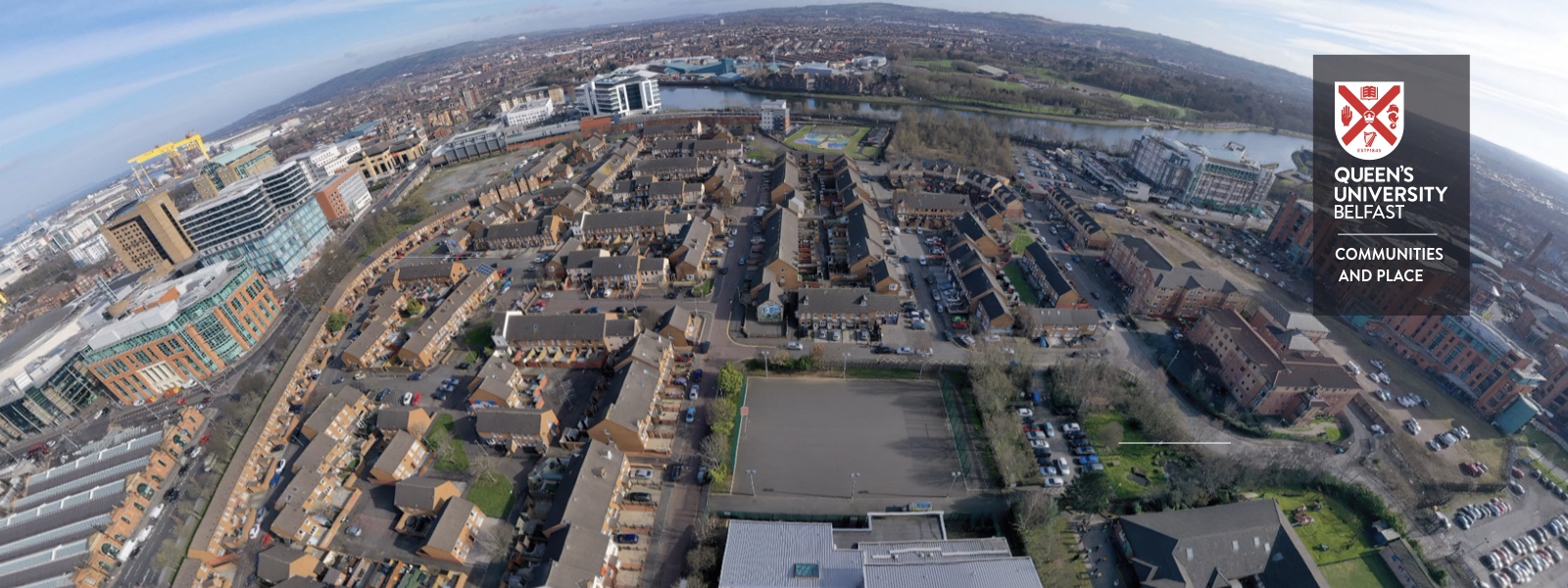Background and policy context
Combining experiential knowledge from the community with academic insight, Queen’s Communities and Place (QCAP) employs a place-based approach to co-create solutions addressing persistent physical, economic and social challenges, while strengthening the engagement between Queen’s and the communities it serves (Higgins et al., 2023). Central to QCAP is the three-year qualitative longitudinal (QL) study Growing Up in the Market (GUIM) exploring inequalities in the lived experiences for children and families in the Market area, identifying barriers and enablers to inform effective interventions over time.
QCAP launched its pilot initiative with the Market Development Association in 2021, co-designing initial activities and aiming to ultimately expand into other communities in Northern Ireland. In common with other UK regions, Northern Ireland has significant wealth, income, health, wellbeing, and education disparities differentiated by class, race, religion and location (Amin, 2022; Department for Communities, 2023). Securing sustainable progress from the Good Friday Agreement requires addressing issues within Northern Ireland's most deprived communities, which continue to face substantial division and inequality despite wider peace impacts.
Place-based approaches strongly feature across contemporary UK research, innovation, and policy landscapes, evidenced by a new national office, the Office for Place within the Department for Levelling up, Housing and Communities (see also Kings Fund, 2021; UKRI Place Toolkit). While place may be an agenda item nationally, successful place-based initiatives occur primarily through local, contextualized efforts. They are also not new, for example, the Joseph Rowntree Foundation has long examined place-focused policies and systems impacts on local communities. And for over 20 years, the National Literacy Trust has utilized place-based initiatives targeting low literacy, arguing neighbourhood and system-level factors critically shape educational outcomes, exerting stronger influence than other elements like social class (Crew, 2020; Dyson et al., 2012).
There is growing recognition among funders that the issues they want to address, particularly in the most disadvantaged areas, where past interventions have historically failed to yield sustainable improvements, are likely to require a place-based, multifaceted, and holistic approach (Cairns, Buckley and Taylor, 2015; Buckley and Taylor, 2017). Communities are shaped by complex ecologies in which a series of systems, including family, school, and culture, interact in the context of place to affect outcomes directly and indirectly. Initiatives which address only one aspect of these ecologies will have limited impacts and holistic, area-based approaches are required to address the societal challenge of sustainable improvements to outcomes. In response, policymaking at national and international levels is increasingly informed by a ‘place-based’ agenda (McCann, 2019).
Within Northern Ireland, the 1991 Targeting Social Need (TSN) initiative aimed to address significant socioeconomic differences across Catholic and Protestant communities (NIO, 2002), with mandated employment targets for disadvantaged areas. The initiative was strengthened in 1998, and relaunch as NewTSN. NewTSN was also identified in the Good Friday Agreement as one of the Government's socio-economic commitments. Recent place-focused approaches emphasize maximizing disadvantaged areas’ capacities for ‘levelling up’ and equalizing opportunity as a driver of national growth and improved living standards (Tomaney & Pike, 2020). The people and Place review currently underway within the Department for Communities seeks to provide an evidenced informed approach to place making policy within NI.
GUIM originated from engagement with the local community and a range of key stakeholders highlighting interconnected, compounded issues. This included a changing post lockdown education landscape; increasing concerns about a rise in the cost of living, exacerbated by the pandemic and pre-existing priorities around qualifications, employment, health, wellbeing and housing based on earlier engagement and surveys (Hargey, 2019).
Amin, A. (2022), ‘Communities, places and inequality: a reflection’, IFS Deaton Review of Inequalities, https://ifs.org.uk/inequality/communities-places-and-inequality-a-reflection
Buckley, E. & Taylor, P. M., 2017. Historical review of place based approaches. [Online] Available at: https://lankellychase.org.uk/multipledisadvantage/publications/historical-review-of-place-based-approaches/
Cairns, B., Buckley, E., and Taylor, M., (2016) Working in place: A framework for place-based approaches. Institute for Voluntary Action Research. London Funders
Crew, M., 2020. The Effectiveness of Place-Based Programmes and Campaigns in Improving Outcomes for Children: A Literature Review. A National Literacy Trust Research Report. National Literacy Trust.
Department for Communities (2023) Northern Ireland Poverty and Income Inequality report 2021-22 Available at: https://www.communities-ni.gov.uk/publications/northern-ireland-poverty-and-income-inequality-report-2021-22
Dyson, A., Kerr, K., Raffo, C., Wigelsworth, M. (2012) ‘Developing Children’s Zones for England’, Save the Children report.
Hargey, F. (2019) We Must Dissent: A framework for community renewal. Market Development Association.
McCann, P. (2019) UK Research and Innovation: A Place-Based Shift? University of Sheffield Management School, University of Sheffield.
Northern Ireland Office (NIO). (2002) NewTSN Annual Report 2002, Including Action Plan April 2002 to March 2004, [PDF File; 233KB]. Belfast: Northern Ireland Office (NIO).
Tomaney, J., & Pike, A. (2020) ‘Levelling up?’ The Political Quarterly. 91(1): 43–48
See Also - https://www.kingsfund.org.uk/ and https://www.ukri.org/wp-content/uploads/2022/07/UKRI-140722-PlaceToolkit.pdf

